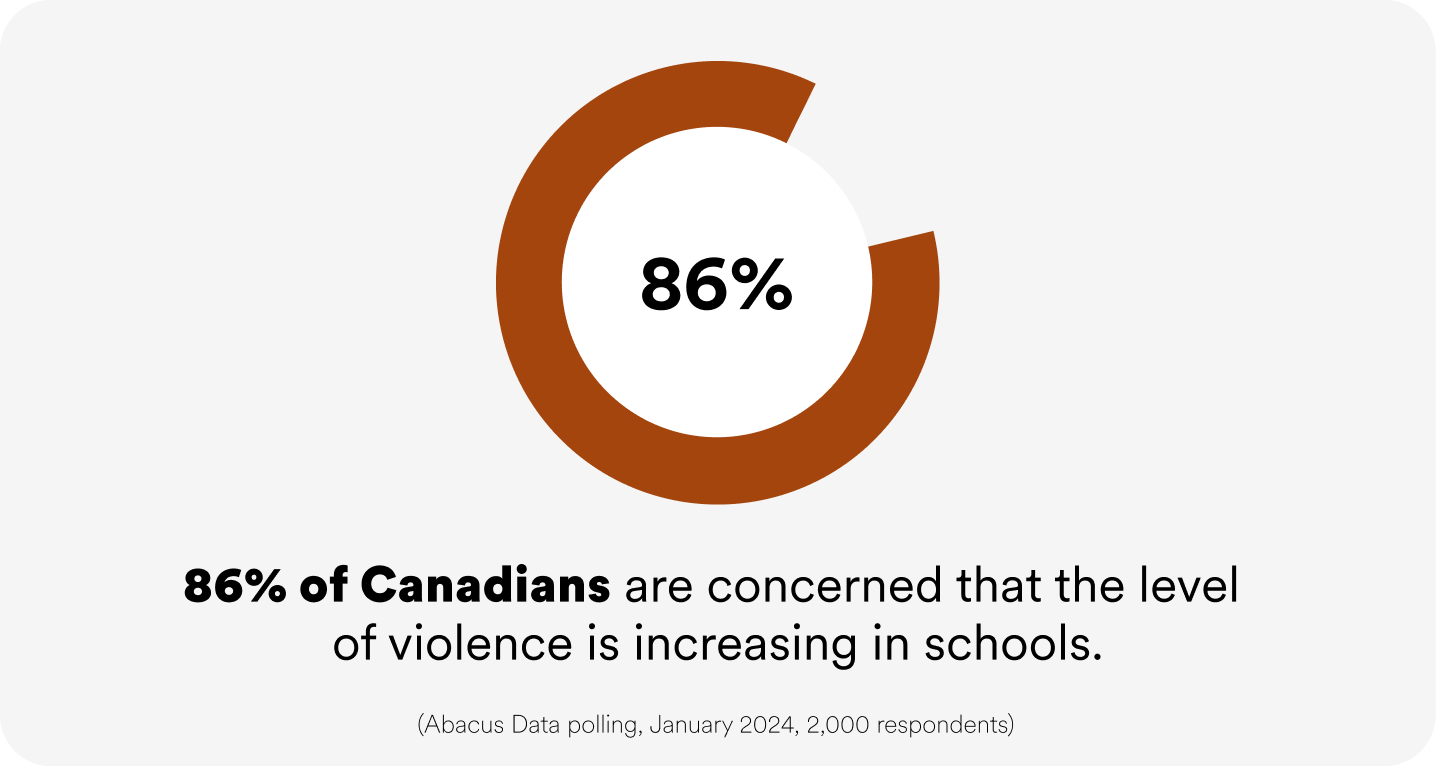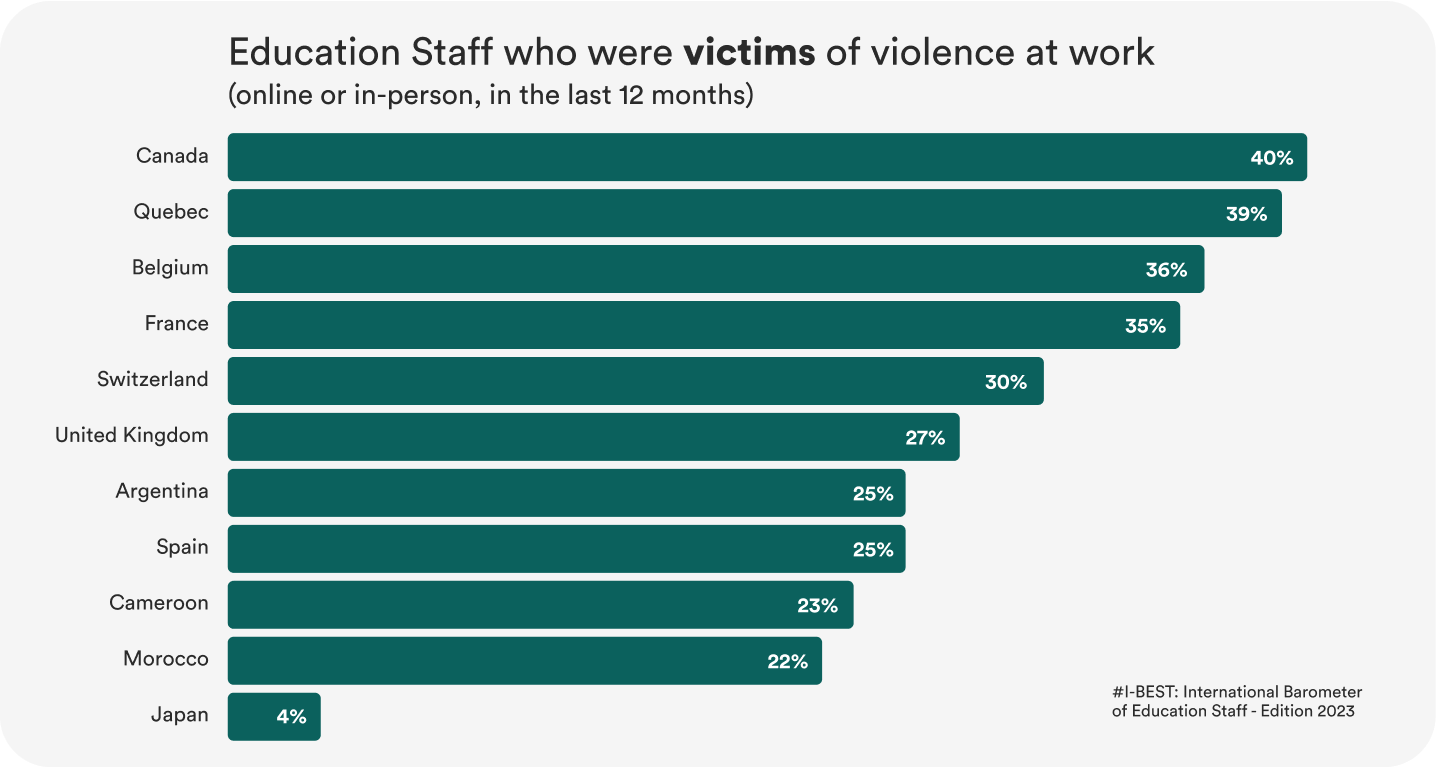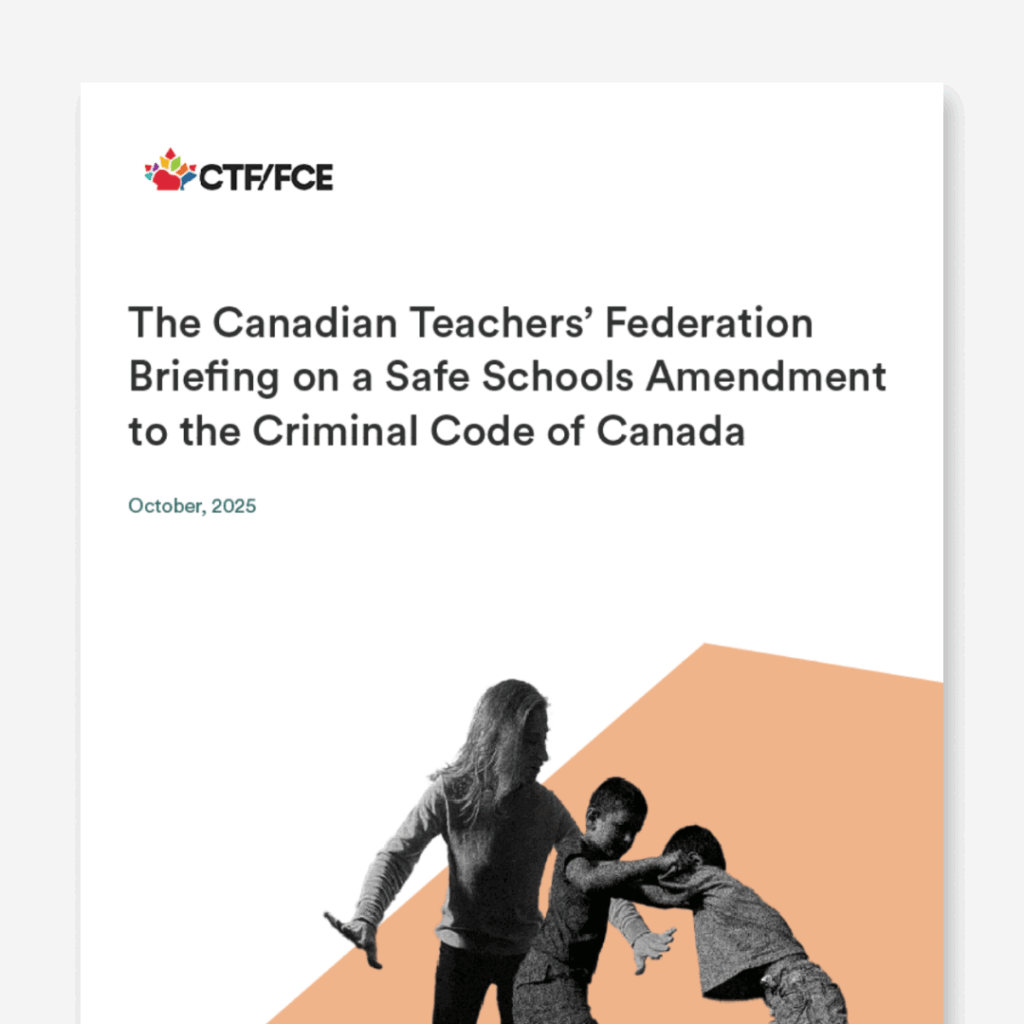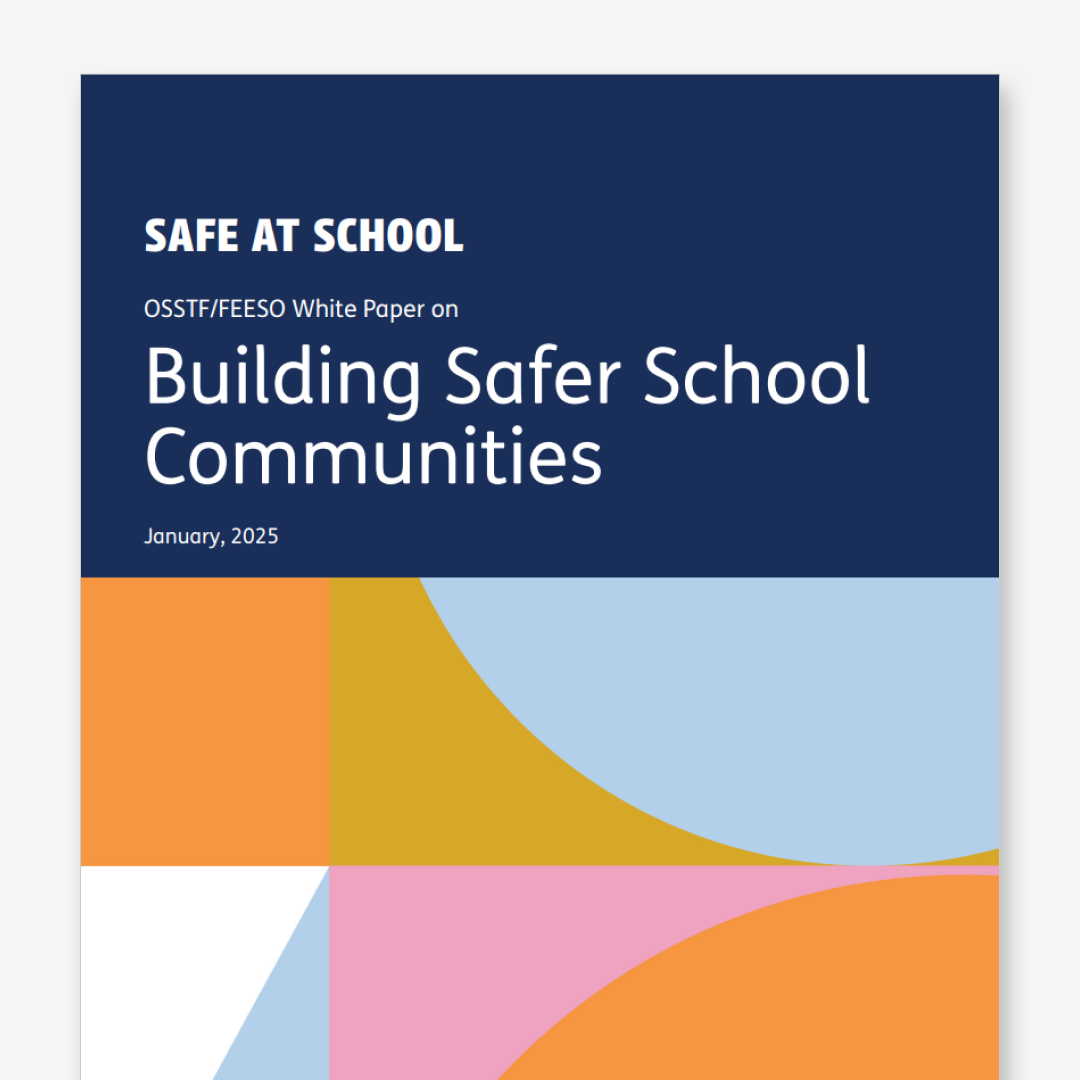Stop Violence in Schools
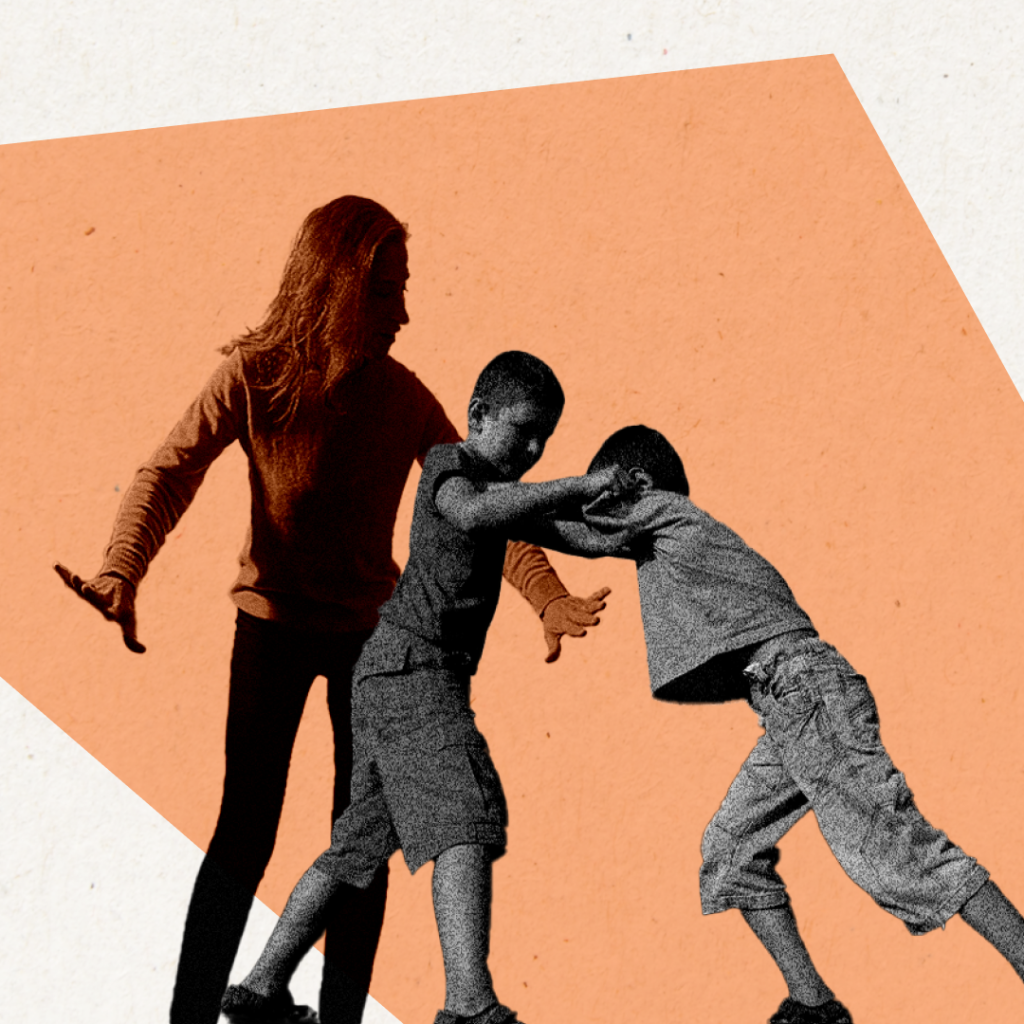
Take Action to Make Schools Safer
Because every student and every educator deserve to be safe at school!
86% of Canadians expressed their concern about the escalating levels of violence in public schools. (Abacus Data, January 2024)
Ensuring safe schools is a shared responsibility, and it demands urgent, coordinated action.
The Reality We Can’t Ignore
Every child deserves to learn in a safe, caring environment. Every parent should feel confident that school is a place where their children are protected and supported. And every educator has the right to a workplace free from fear and harm.
But today, schools across Canada are facing a rise in violence, and it’s getting worse. Teachers and education workers are reporting alarming levels of physical and verbal aggression. Incidents are happening more often, becoming more severe, and affecting more people. Whether it’s students harming educators, students attacking their peers, or parents confronting educators, something needs to be done to address this longstanding and growing problem.
Canadian classrooms, meant to be a space for learning and growth, are becoming unsafe. This is not just a workplace issue; it’s a public emergency that touches every family and community. When violence disrupts learning, the consequences ripple outward: students’ future, educators’ well-being, the health of our public education system, and the future of our communities are all at stake. Ensuring safe schools is a shared responsibility, and it demands urgent, coordinated action now.
The numbers to support this story and our narrative are scary and harrowing.
“Aggression is definitely an issue in my school. We are seeing extreme behaviors in some of our youngest students. Tantrums, hitting, kicking, biting, and spitting. Some of those students have identified needs. Some do not. These behaviors are not only directed towards staff, but other students as well.”
– Elementary teacher and member of the CTF/FCE Advisory Committee on Indigenous Education
The Facts
- 41% of educators disagree with the statement that they have a safe work environment. (Parachute Survey, fall 2024, 4,771 respondents)
- 55% of educators say they’ve experienced workplace violence and aggression in the past 12 months. (Parachute Survey, fall 2024, 4,771 respondents)
- 86% of Canadians are concerned that the level of violence is increasing in schools. (Abacus Data polling, January 2024, 2,000 respondents)
- 87% of Canadians agree that teachers and staff should have the right to physically intervene when students are violent towards other individuals. (Abacus Data polling, January 2024, 2,000 respondents)
- Canada and Quebec (polled separately for this survey) rank 1 and 2, respectively for educators reporting that they have experienced or witnessed verbal violence in the workplace. (The International Barometer on Education Staff, Edition 2023, 26,281 respondents from 11 jurisdictions)
The Root Causes
- Chronic underfunding
- Insufficient numbers of qualified teachers and education workers
- Large and complex classes
- Gaps in student mental health supports
- Food insecurity and economic uncertainty
- Inconsistent reporting of school violence and limited accountability
- Lack of appropriate legislation to allow educators to intervene reasonably in violent situations
“What we found was really shocking to us and shocking to the general public and was probably not all that surprising to teachers you know: really high rates of violence, really high rates of harassment, and 54% of our respondents said they’d experienced an act of violence. There’s really compelling evidence that this is increasing. I mean, as a criminologist, whenever I hear ‘oh, rates are going up’, I usually think ‘oh, reporting rates are going up’ or ‘this is an artifact of the media’. But, in this case, it seems to be legitimately increasing and at an almost unthinkable rate.”
– Dr. Chris Bruckert, Chair of the Department of Criminology and Professor of Criminology at the University of Ottawa, speaking about classroom violence
What the CTF/FCE Is Asking for
A “Safe Schools Amendment” to the Criminal Code
The Canadian Teachers’ Federation (CTF/FCE) is calling on the Government of Canada and the Minister of Justice and Attorney General to pass legislation to amend the Criminal Code to keep classrooms safe. You can read the text of our “Safe Schools Amendment” in our legislative brief.
The “Safe Schools Amendment” would amend a section of the Criminal Code to give educators the legal clarity they need to intervene responsibly and reasonably in violent situations, whether it’s breaking up a fight, preventing a student from self-harm, or protecting themselves and others, without fear of disciplinary action or criminal charges. We already trust teachers with the care and safety of our children every day. It’s time we also trust them to act decisively to keep classrooms and schools safe.
But this issue isn’t just federal, it’s provincial too. Violence in schools demands coordinated action at every level of government.
Here’s How You Can Help
- Send a letter to your Member of Parliament and urge them to support the “Safe Schools Amendment”.
- Let your Premier and Minister of Education know that this is a top priority.
Other Ways You Can Help
- Share this webpage with your networks, on social media, in newsletters, and with colleagues, to raise awareness and grow support.
- Speak up. Talk to your school board, trustees, or local elected officials, whether they are a Member of Provincial Parliament, Legislative Assembly, or National Assembly. Emphasize the urgent need for smaller class sizes and more one-on-one supports to help prevent violence before it starts.
- Report every incident. If you are an educator, please report all incidents of violence. We know the process can be frustrating and time-consuming, but underreporting hides the scale of the crisis. Your report provides data needed to demand systemic change and protect everyone in our public schools.
Myth Busting
Does this mean the CTF/FCE supports corporal punishment?
No. In 1989, following a long history of opposing corporal punishment, the CTF/FCE adopted the following policy to further clarify our opposition to such harm: “The CTF/FCE opposes the use of corporal punishment.” The CTF/FCE’s leadership is comprised of both parents and teachers and everyone at the CTF/FCE views corporal punishment as an abusive and antiquated approach that has no place in modern society.
Isn’t education a provincial and territorial responsibility?
Yes, and the CTF/FCE recognizes and supports the work of our Member and Associate Organizations (unions at the provincial and territorial level) in doing the primary work associated with K-12 education in Canada. However, violence in the classroom is an issue that all levels of government and communities should be concerned about and working to eliminate. As a pan-Canadian organization, we have identified one way for the federal government to address the problem: our “Safe Schools Amendment”.
Isn’t this at odds with the Truth and Reconciliation Commission’s Call to Action to repeal Section 43 of the Criminal Code?
No. The CTF/FCE fully endorses all Truth and Reconciliation Commission Calls to Action including #6 which calls upon the federal government to repeal Section 43 of the Criminal Code. We see this as an important act of reconciliation with Indigenous peoples. The CTF/FCE Advisory Committee on Indigenous Education, a body comprised of Indigenous educators that advises the CTF/FCE Executive, has guided the Federation’s advocacy on this issue and strongly indicated that there need to be protections in place for educators in the classroom. Hear more from these Indigenous educators here on a podcast discussing the issue: ABSENT: Not Meeting Student Needs.
Learn More
Podcast Episodes
“Words Matter” is a fundamental principle that should guide every interaction. Join Iyanuoluwa Akinrinola from the CTF/FCE for a compelling discussion on the growing issue of harmful language in Canadian schools. Alongside leading advocates from Harmony Movement, this episode explores the epidemic of aggression and harmful language in schools and its serious impact on school communities. Highlighting the “Words Matter” campaign, this episode delves into actionable strategies for creating safe and inclusive school environments through restorative justice and shared responsibility.
To learn more about the history of violence in schools, recent research, the causes, link to teachers leaving the profession, and more, tune in to the first episode of our podcast series, ABSENT.
To learn more about the rise of violence in Canadian schools, possible solutions, what the CTF/FCE is doing to advocate about the issue, and more, tune in to episode 2 of our podcast series, ABSENT.

